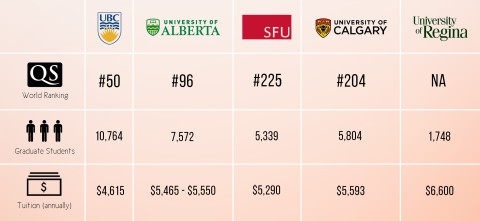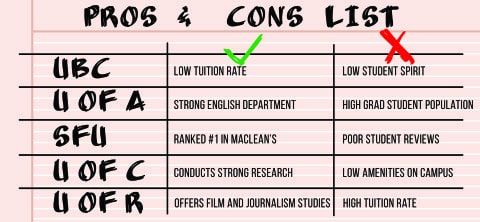If you’re thinking about relocating to another university — for graduate studies or to just finish your undergraduate degree — finding the right one can be overwhelming. However, if you don’t want to stray too far from home, western Canada offers plenty of solid choices.
It’s a new semester at the University of Saskatchewan and for returning undergraduate students, that likely means you’re one step closer to finishing your degrees. With this feeling of accomplishment comes a minor sense of dread for the future, with many students wondering “what next?”
Obviously, there are different strokes for different folks, and there’s a lot to consider when it comes to choosing the right school for you. While your field of study should take highest priority in choosing where to apply to, there’s more to your decision than just that.
in choosing where to apply to, there’s more to your decision than just that.
If you’re a homebody and don’t want to stray too far from Saskatchewan — or if you just plain hate Toronto — there are lots of good choices at your disposal.
The University of British Columbia, based primarily out of Vancouver, B.C., obviously has the perk of being located in one of the most gorgeous parts of the country — offering a far cry from the brutal Saskatchewan winters. It also offers graduate degrees in more than 250 fields, from civil engineering to harpsichord, so you can get a master’s degree in almost any area you want.
UBC is also one of the most prestigious schools in the country. In the 2015-16 edition of QS Top Universities’ annual World University Rankings, UBC placed 50th — the third highest placing in Canada and the highest this side of Ontario.
Likewise, in Maclean’s ranking of Canadian universities in October 2015, UBC maintained its third place position in the Medical Doctoral category, behind the University of Toronto and McGill University
Tuition for research master’s and doctoral programs at UBC comes in at a comparably economical $4,615.35 annually, while professional degree programs vary.
However, with a 2014-15 student body of 59,659 — 10,764 of whom are graduate students — it may be a little too easy to slip into the crowd. Likewise, Cameron Metcalfe, a third-year undergraduate student studying physics and education, finds campus culture to be pretty weak.
“At the beginning of the year, there is no frosh week, no welcome week. We jump right into classes, which is disappointing,” Metcalfe said in an email interview with the Sheaf. “It doesn’t help with the problem that there doesn’t feel like there is much school spirit at UBC.”
So while UBC may be a good pick for those medically minded among us, if you’re looking for a sense of belonging away from home, you may be out of luck.
The University of Alberta has its appeals as well. Located on the south side of the the North Saskatchewan river in Edmonton, Alta., the centralized location of the U of A is a definite bonus, as it is a short distance from both downtown and the Whyte Avenue district, a popular shopping destination and cultural hub in the city.
While not rated as highly as UBC in the World University Rankings, the U of A came in at a respectable 96th place. Furthermore, it seems that the institution may strike a happy medium between UBC and the U of S on a number of levels.
In the Maclean’s 2015 Medical Doctoral ranking, the U of A placed fifth. However, it seems that the department of English and film is where the school really stands out. In 2014, it was found to have the 22nd best department for English language and literature worldwide by QS World Universities, with only the University of Toronto placing higher in Canada.
Among the department’s specialities are post-colonial and gender and sexuality studies, while the faculty also runs the Canadian Literature Centre, a community of writers, researchers, publishers and more who aim to foster and strengthen the study of literature in the country.
While a top notch English department may be a feather in its cap, the U of A offers master’s and doctoral degrees in 170 fields of study, guaranteeing you plenty of other options as well.
The total student population at the U of A for the 2014-15 year was 38,733, likely affording you a little more breathing room on campus than UBC does. However, with 7,572 of these being graduate students, your number of peers may not be overly affected.
Tuition at the U of A is $5,465 for course-based master’s programs and $5,550 for doctoral programs and thesis-based masters annually.
Simon Fraser University, based out of Burnaby, B.C., has a couple of aces up its sleeve when it comes to attracting prospective students. The comprehensive category of the 2015 Maclean’s rankings found SFU sitting on top of the list.
Likewise, in a 2012 report comparing breadth and depth of research conducted at Canadian universities, the Higher Education Strategy Associates found SFU to be one of the top 10 schools in the country in both of its categories: 10th in social science and humanities and sixth in science and engineering.
Of course, while wholly superficial, going to school atop a mountain can most likely be considered a bonus to studying at the gorgeous SFU campus. The institution also offers dozens of graduate degree programs, affording students plenty of directions to take.
This is all considerably high praise, but it’s not all as rosy at SFU as it may seem. Despite being listed at number one on the comprehensive Maclean’s poll, the university dropped to 12th place in the student satisfaction poll.
Additionally, it placed dead last in a poll asking if students believed their school was adequately preparing them for employment, with only 22 per cent of respondents from SFU strongly agreeing.
As of fall 2015, tuition for graduate students at SFU sits at $5,290.14 annually, and with enrolment for the 2014-15 year coming in at 35,141 — 5,339 of which are graduate students — these numbers are more-or-less middle of the road.
 So, while SFU seems to be a solid pick for furthering your education — especially if you’re looking to study in the fields of science or engineering — if you apply, just don’t expect to always enjoy yourself.
So, while SFU seems to be a solid pick for furthering your education — especially if you’re looking to study in the fields of science or engineering — if you apply, just don’t expect to always enjoy yourself.
The University of Calgary is also a commendable choice for students. Located in northwest Calgary, the U of C has a respectable reputation in western Canada. In 2015, the QS rankings found it to be the best university under 50 years old in North America, placing 12th overall.
In another 2015 ranking of Canadian universities, the Globe and Mail found the U of C to be above average in the research it conducted. This same ranking found the university to have strong programs for both veterinary sciences and development planning.
Compared to the previously examined schools, U of C is also relatively small, with a student headcount of 30,201 — 5,804 of which are graduate students. Still, it offers a veritable smorgasbord of program options for graduate studies.
Living in Calgary would certainly offer its perks as well. As an arts hub, students would certainly have lots of options on how to spend free time — but if you’re not into that sort of thing, you can always opt to sport a cowboy hat instead of a man-bun.
Tuition for doctoral and thesis-based masters programs comes in at $5,593.50, the highest of any school examined so far, if only by a couple of dollars. Still, if money is a concern, you may want to look elsewhere.
Lastly, for the student who really doesn’t want to stray too far from home, there’s always the University of Regina located in Regina, Sask.
While it can be occasionally overlooked and written off by some snooty U of S elitists — myself included — in truth, the U of R actually offers some programs and opportunities that we could only dream of here, making it an appealing and convenient choice for graduate studies.
It’s definitely a smaller school, with the enrolment numbers breaking records in fall of 2015 at a whopping 14,360 — 1,748 of which were graduate students.
It may be a smaller scale than we’ve seen so far, but that may be what you’re looking for. The U of R offers just over 50 master’s degree programs and 18 doctoral programs. However, the fields for these degrees is what’s really interesting.
The U of R offers graduate studies in both the department of film and journalism, neither of which are offered at the U of S. So for students who need to leave Saskatoon to study in either of those fields, a solution may be close at hand.
It’s not like the U of R is a half-assed university either. It placed 12th in the Maclean’s comprehensive ranking in fall 2015. While 12th place may pale in comparison to SFU’s number one standing, keep in mind that neither UBC, the U of A or the U of C appeared in the top 15.
Unfortunately, as of winter 2016, tuition for graduate programs at the U of R comes in at roughly $6,600, which is pretty whopping, so that’s something to keep in mind.
Compared to cities like Edmonton and Vancouver, Regina may not have as much to offer for recreation during your down time, but most students would likely still find the city to be agreeable.
While no one can know or decide which school is best for you but you, taking a cursory look at a handful of western Canadian schools reveals some information worth keeping in mind.
UBC might be a good pick if you don’t want to break the bank and don’t mind dealing with crowds. If you’re looking to study English and literature, the U of A may be something to look at. SFU offers mountain views but student blues, while the U of C would never leave you bored. But if you’re a fan of small classes and weekend trips home, the U of R may be just right for you.
—
Infographic: Jeremy Britz / Graphics Editor
Pros & Cons Image: Stephanie Mah / Layout Manager
Leave a Reply